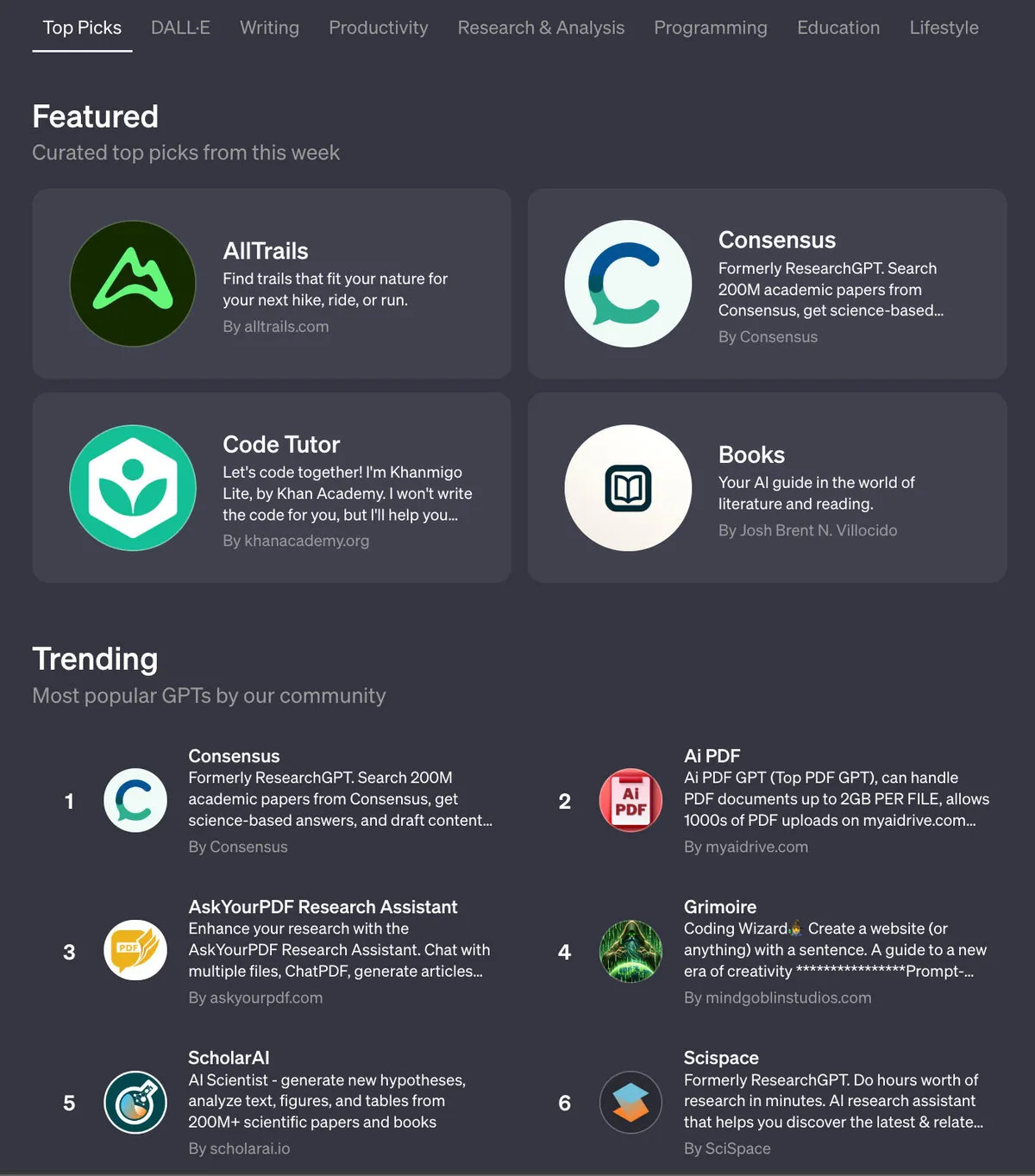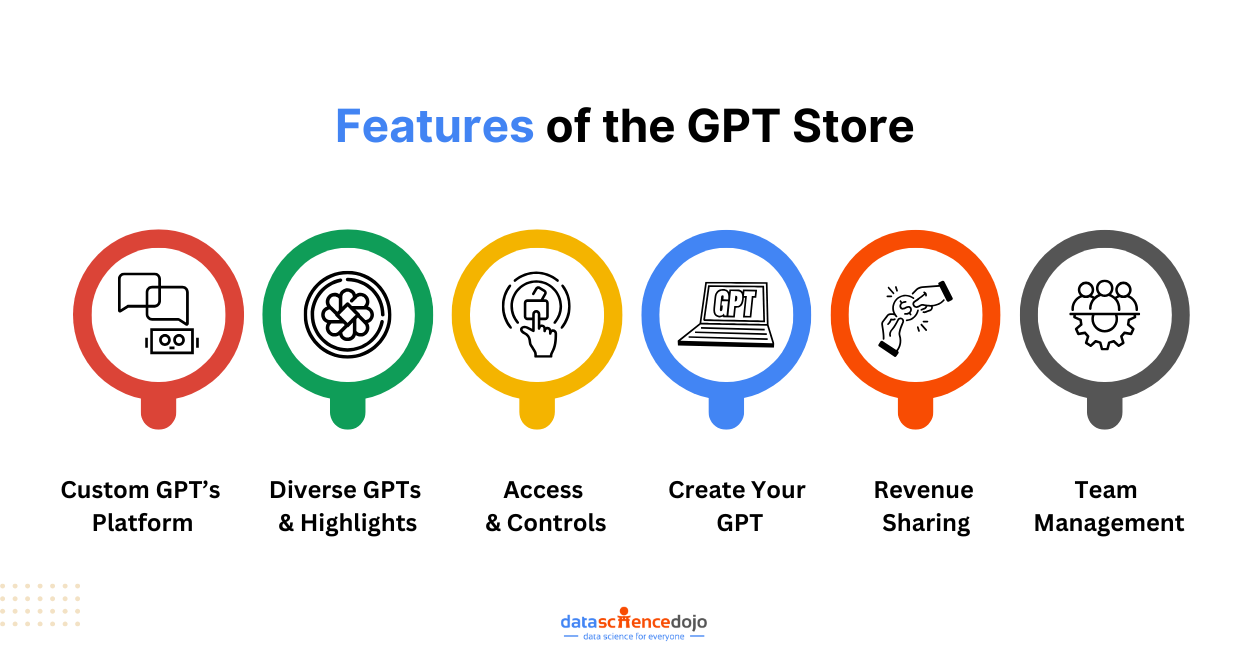In the rapidly evolving world of artificial intelligence, OpenAI has marked yet another milestone with the launch of the GPT Store. This innovative platform ushers in a new era for AI enthusiasts, developers, and businesses alike, offering a unique space to explore, create, and share custom versions of ChatGPT models.
Understand the revolutionary AI technology of ChatGPT
In this blog, we will delve into the exciting features of the GPT Store, its potential impact on various sectors, and what it means for the future of AI applications.
What is a GPT Store?
The GPT Store is a platform designed to broaden the accessibility and application of AI technologies. It serves as a hub where users can discover and utilize a variety of GPT models. These models are crafted by OpenAI and community members, enabling a wide range of applications and customizations.

This initiative represents a significant step in democratizing AI technology, allowing both developers and enthusiasts to share and leverage AI advancements in a more collaborative and innovative environment.
Understand the Revolutionary AI technology of ChatGPT
Key Features of GPT Store
A platform for custom GPTs
It is an innovative platform where users can find, use, and share custom versions of ChatGPT, also known as GPTs. These GPTs are essentially custom versions of the standard ChatGPT, tailored for a specific purpose and enhanced with their additional information.
Diverse range and weekly highlights
The store features a diverse range of GPTs, developed by both OpenAI’s partners and the broader community. Additionally, it offers weekly highlights of useful and impactful GPTs, serving as a showcase of the best and most interesting applications of the technology.
Availability and enhanced controls
It is accessible to ChatGPT Plus, Teams, and Enterprise For these users, the platform provides enhanced administrative controls. This includes the ability to choose how internal-only GPTs are shared and which external GPTs may be used within their businesses.
User-created GPTs
It also empowers subscribers to create their own GPTs, even without any programming expertise.
For those who want to share a GPT in the store, they are required to save their GPT for everyone and verify their Builder Profile. This facilitates a continuous evolution and enrichment of the platform’s offerings.
Explore fun facts for Data Scientists using ChatGPT
Revenue-sharing program
An exciting feature is its planned revenue-sharing program. This program intends to reward GPT creators based on the user engagement their GPTs generate. This feature is expected to provide a new lucrative avenue for them.
Learn 6 Marketing Analytics Features to drive greater Revenue
Management of team and enterprise customers
It offers special features for Team and Enterprise customers, including private sections with securely published GPTs and enhanced admin controls.
These were some of the main features of the GPT Store. Let’s look at some of the most talked about GPT’s available on the GPT store.
Examples of Custom GPTs Available on the GPT Store
The earliest featured GPTs on the platform include the following:
- AllTrails: This platform offers personalized recommendations for hiking and walking trails, catering to outdoor enthusiasts.
- Khan Academy Code Tutor: An educational tool that provides programming tutoring, making learning code more accessible.
- Canva: A GPT designed to assist in digital design, integrated into the popular design platform, Canva.
- Books: This GPT is tuned to provide advice on what to read and field questions about reading, making it an ideal tool for avid readers.
These were some of the examples of custom GPT’s available on the GPT store. Other examples of GPTs include Consensus, Ai PDF, Scispace etcetera.
Learn how ChatGPT detection is made easy
Significance of GPT’s in OpenAI’s Business Strategy
This is a significant component of OpenAI’s business strategy as it aims to expand OpenAI’s ecosystem, stay competitive in the AI industry, and serve as a new revenue source. The Store likened to Apple’s App Store, is a marketplace that allows users to list personalized chatbots, or GPTs, that they’ve built for others to download.
By offering a range of GPTs developed by both OpenAI business partners and the broader ChatGPT community, this platform democratizes AI technology, making it more accessible and useful to a wide range of users.
Boost your business with ChatGPT through 10 innovative ways
Importantly, it is positioned as a potential profit-making avenue for GPT creators through a planned revenue-sharing program based on user engagement. This aspect might foster a more vibrant and innovative community around the platform.
By providing these platforms, OpenAI aims to stay ahead of rivals such as Anthropic, Google, and Meta in the AI industry. As of November, ChatGPT had about 100 million weekly active users and more than 92% of Fortune 500 companies use the platform, underlining its market penetration and potential for growth.
GPT’s Role in Shaping the Future of AI
The launch of the platform by OpenAI is a significant milestone in the realm of AI. By offering a platform where various GPT models, both from OpenAI and the community, are available, the AI platform opens up new possibilities for innovation and application across different sectors.
It’s not just a marketplace; it’s a breeding ground for creativity and a step forward in making AI more user-friendly and adaptable to diverse needs. The potential of the newly launched Store extends far beyond its current offerings.
Is Chatgpt as a new AI tool a game changer?
It signifies a future where AI can be more personalized and integrated into various aspects of work and life. OpenAI’s continuous innovation in the AI landscape, as exemplified by the GPT platform, paves the way for more advanced, efficient, and accessible AI tools.
This platform is likely to stimulate further AI advancements and collaborations, enhancing how we interact with technology and its role in solving complex problems. This isn’t just a product; it’s a gateway to the future of AI, where possibilities are as limitless as our imagination.






